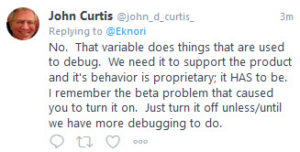Happy New Year 2019


Fixing memory leaks may not be not the shiniest skill on a CV, but when things go wrong on production, it’s better to be prepared!
After reading this article, you’ll be able to monitor, understand, and debug the memory consumption of a Node.js application.
Kévin Maschtaler
https://marmelab.com/blog/2018/04/03/how-to-track-and-fix-memory-leak-with-nodejs.html
In addition to this very good article , here are a couple of tipps how to enable remote debugging.
node –inspect=192.168.178.133:9229 yourapp.js
This will bind the debugger to a different IP address:port. Otherwise only LOCALHOST will be available
If you are using PM2
pm2 start –node-args=”–inspect=192.168.178.133:9229″ yourapp.js
Then open Chrome browser and navigate to chrome://inspect
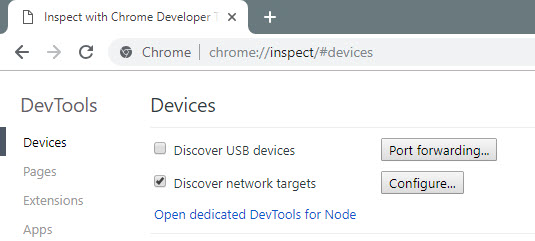
Check “Discover network targets” and click “Configure”
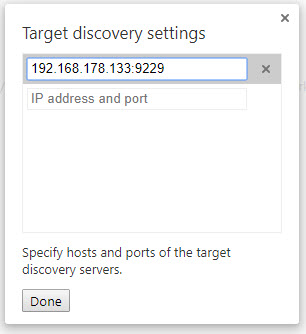
Your application is ready for inspect
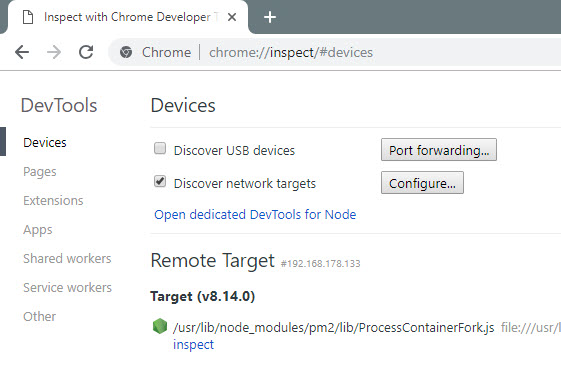
I have put together a small sample to demonstrate how to use NotesDominoQuery from LotusScript.
I created a new Class DQLWrapper. A little bit over the top, I know.
%REM
Library 10010.dql
Created Dec 30, 2018 by Ulrich Krause/singultus
%END REM
Option Declare
%REM
Class DqlWrapper
%END REM
Public Class DqlWrapper
m_query As String
m_session As NotesSession
m_db As NotesDatabase
m_ndq As NotesDominoQuery
%REM
Sub New
%END REM
Public Sub New(strDbFilePath As String)
Set me.m_session = New NotesSession
Set me.m_db = me.m_session.Getdatabase("",strDbFilePath, False)
If ( me.m_db.Isopen ) then
Set me.m_ndq = me.m_db.Createdominoquery()
Else
' // do some error handling
End if
End Sub
%REM
Public function executeQuery()
%END REM
Public function executeQuery() As NotesDocumentCollection
If ( me.m_query <> "" ) then
Set executeQuery = me.m_ndq.Execute(me.m_query)
Else
Set executeQuery = nothing
End If
End Function
%REM
Public Function explainQuery()
%END REM
Public Function explainQuery() As String
If ( me.m_query <> "" ) Then
explainQuery = me.m_ndq.Explain(me.m_query)
Else
explainQuery = ""
End If
End Function
%REM
Public Function explainQuery()
%END REM
Public Function parseQuery() As String
If ( me.m_query <> "" ) Then
parseQuery = me.m_ndq.parse(me.m_query)
Else
parseQuery = ""
End If
End Function
%REM
Property query
%END REM
Public Property Set query As String
me.m_query = query
End property
End Class
The query itself is executed from an agent that runs on the server. At the moment it is not possible to run a query client/ server.
Here is the code for the agent
%REM
Agent dql.execute
Created Dec 30, 2018 by Ulrich Krause/singultus
%END REM
Option Public
Option Declare
Use "10010.dql"
Sub Initialize
Dim query As String
Dim col As NotesDocumentCollection
query = "firstname = 'Ulrich' And lastname = 'Krause'"
Dim dql As New DQlWrapper("names.nsf")
dql.query = query
If ( LCase(dql.parseQuery()) ="success" ) Then
Set col = dql.executeQuery()
MsgBox "QRY returns # docs: " + CStr(col.count)
If ( col.count > 0 ) then
Dim doc As NotesDocument
Set doc = col.Getfirstdocument()
MsgBox "UNID of first doc: " + doc.Universalid
End if
Else
MsgBox dql.explainQuery()
End If
End Sub
You can now start the agent from the server console. You will get the number of documents for this query and the UNID of the first document found.
te amgr run "ec11.nsf" 'dql.execute'
[0DFC:001F-0FFC] 30.12.2018 13:49:10 AMgr: Start executing agent 'dql.execute' in 'ec11.nsf'
[0DFC:001F-0FFC] 30.12.2018 13:49:10 Agent Manager: Agent message: QRY returns # docs: 1
[0DFC:001F-0FFC] 30.12.2018 13:49:10 Agent Manager: Agent message: UNID of first doc: D8436D0F4E546BA3C12573FE0070AE88
[0DFC:001F-0FFC] 30.12.2018 13:49:10 AMgr: Agent 'dql.execute' in 'ec11.nsf' completed execution
If your query contains errors / is not understandable, you will see an output similar like this on your console
[0DFC:0020-11D0] 30.12.2018 13:59:45 Agent Manager: Agent 'dql.execute' error: Domino Query execution error: Query is not understandable - syntax error - processing or expecting operator (=, <, <= …) token syntax (Call hint: OSCalls::OSLocalAllc, Core call
0) firstname = 'Ulrich' And lastname IS 'Krause' …………………………….^……….. ****
[0DFC:0020-11D0] 30.12.2018 13:59:45 AMgr: Agent 'dql.execute' in 'ec11.nsf' completed execution
In a test or development environment we can start a node.js application with npm start . But this is not, what we want to do in production.
We need to start the application as soon as the server is up and running.
Here is a quick and easy way to achieve this goal.
Create a new file in /etc/systemd/system ( domino-db.service for example )
[Unit]
Description=domino-node-list sample
[Service]
ExecStart=/git/domino-node-list/app.js
Restart=always
User=root
Group=root
Environment=PATH=/usr/bin:/usr/local/bin
Environment=NODE_ENV=production
WorkingDirectory=/git/domino-node-list/
[Install]
WantedBy=multi-user.target
Modify ExecStart and WorkingDirectory to point to the correct path in your installation.
Save domino-db.service and set execution rights to 744.
Check app.js for proper execution right (744).
Edit app.js and add
#!/usr/bin/env node
as the first line in the code.
Enable the service
systemctl enable domino-db
Created symlink from /etc/systemd/system/multi-user.target.wants/domino-db.service to /etc/systemd/system/domino-db.service.
Check with
systemctl status domino-db
● domino-db.service - domino-node-list sample
Loaded: loaded (/etc/systemd/system/domino-db.service; enabled; vendor preset: disabled)
Active: active (running) since Sun 2018-12-30 10:24:04 CET; 4min 15s ago
Main PID: 7163 (node)
Tasks: 7
CGroup: /system.slice/domino-db.service
└─7163 node /git/domino-node-list/app.js
Dec 30 10:24:04 serv02.fritz.box systemd[1]: Started domino-node-list sample.
Dec 30 10:24:04 serv02.fritz.box systemd[1]: Starting domino-node-list sample...
Dec 30 10:24:05 serv02.fritz.box app.js[7163]: Example app listening at http://:::3000
You can now start and stop the service at any time using
systemctl start domino-db
systemctl stop domino-db
This is a follow up to my recent post https://www.eknori.de/2018-12-28/problem-using-proton-with-proton_ssl1-enabled/
Due to my misunderstanding and also a lack in documentation, I was not able to get PROTON with PROTON_SSL=1 and PROTON_AUTHENTICATION=client_certs running.
But thanks to our great community and a little help from Jan Krejcárek (SUTOL), I was finally able to solve the puzzle.
I must admit that I am not an expert in this field. So please bare with me if things are obvious for you. They are (not yet) for me.
My understanding of using TLS/SSL with PROTON was that I could use my existing Let’s Encrypt certificate to communicate via HTTPS instead of HTTP with my server URL.
But this is not the case. TLS/SSL encryption only enables a secured communication between the domino.db module and the PROTON addin sitting on the Domino server.
Here is an image.
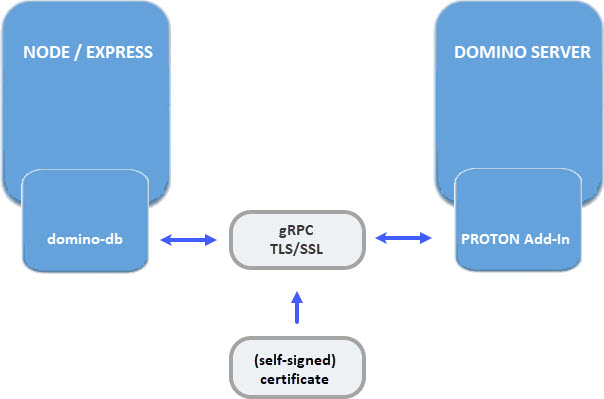
The second thing that I got wrong was the fact that the existing certificate and it’s CA would be enough to enable the secured communication. In my first test, I had set PROTON_AUTHENTICATION=anonymous.
So why bother with client certificates if they are not needed at this point?
I followed Jan’s advice to try with a new generated self-signed certificate. The AppDevPack contains shell scripts to create some sample certs and also lets you create a keyring file that can be used with PROTON.
I have modified the make_keyring.sh file a bit because it complained about missing environment variables.
# added UKR, 12/2018
export NOTESDATA=/local/notesdata
export NOTESBIN=/opt/ibm/domino/notes/10000000/linux
I then created the certs and keyring and copied them to the proper location.
The original source code has used
// proton config
const serverConfig = {
"hostName": "serv02.fritz.box",
"connection": {
"port": 3002
}
}
to define the serverConfig. This must be enhanced, if you are going the secure way.
I created a new module using Jan’s code
const fs = require('fs');
const path = require('path');
/**
* Internal functions that reads a content of a file to a buffer.
* @param {string} fileName
*/
const readFile = fileName => {
return fs.readFileSync(path.resolve(fileName));
}
/**
* (c) Jan Krejcárek
* Creates an object in a structure required for the DominoDB module
* to initialize o connection to the Domino server.
* @param {string} serverHostName Host name of the Domino server
* @param {string} port TCP port number where a Proton task listens for connection requests
* @param {string} rootCertificatePath Path to the certificate used to establish a TLS connection
* @param {string} clientCertificatePath Path to the application certificate used to authenticate the application
* @param {string} clienKeyPath Path to the private key of the application
*/
const config = (serverHostName, port, rootCertificatePath, clientCertificatePath, clienKeyPath) => {
const rootCertificate = readFile(rootCertificatePath);
const clientCertificate = readFile(clientCertificatePath);
const clientKey = readFile(clienKeyPath);
const serverConfig = {
hostName: serverHostName,
connection: {
port: port,
secure: true
},
credentials: {
rootCertificate,
clientCertificate,
clientKey
}
};
return serverConfig;
};
module.exports = config;
All parts in the credentials section are mandatory. Even if you use PROTON_AUTHENTICATION=anonymous with PROTON_SSL=1, you must have certificates and keys for the client as well.
And we can now use this module in app.js
const protonConfig = require('./protonConfigSSL.js');
const serverConfig = protonConfig("serv02.fritz.box", "3002", "./certs/proton-self/ca.crt", "./certs/proton-self/app1.crt", "./certs/proton-self/app1.key");
My PROTON configuration is
[029971:000009-00007F78D8293700] PROTON_AUTHENTICATION=client_cert
[029971:000009-00007F78D8293700] PROTON_KEYFILE=proton-self.kyr
[029971:000009-00007F78D8293700] PROTON_LISTEN_ADDRESS=serv02.fritz.box
[029971:000009-00007F78D8293700] PROTON_LISTEN_PORT=3002
[029971:000009-00007F78D8293700] PROTON_SSL=1
[029971:000009-00007F78D8293700] PROTON_TRACE_REQUEST=0
[029971:000009-00007F78D8293700] PROTON_TRACE_SESSION=0
And after restarting PROTON ( restart task proton ) and starting my application ( npm start ), I was able to open hp.nsf in the browser.
I also found an interesting article by Sven Hasselbach about how to protect PROTON keys.
I hope that this will help others starting with this stuff to save some time.
Heiko Voigt: DominoDB and a big NO-NO !
Sven Hasselbach ( response to Heiko’s post ): DominoDB and a big NO-NO?
By default, PROTON supports anonymous access and an insecure connection. This is a good starting point, but if you want to do something more productive, you should at least have PROTON_SSL set to 1 and a valid certificate at hand.
You can also use a self signed certificate, but most, if not all browsers will reject it. I am using a certificate issued by Lets Encrypt. This is the same certificate that I am using on my Domino server to secure HTTPS connections.
My sample node application uses the excellent sample written by Oliver Busse from https://gitlab.com/obusse/domino-node-list
I have changed package.json to use the latest domino-db module
{
"name": "domino-node-list",
"version": "1.0.0",
"description": "",
"main": "app.js",
"scripts": {
"start": "node app.js",
"test": "echo \"Error: no test specified\" && exit 1"
},
"author": "",
"license": "ISC",
"dependencies": {
"@domino/domino-db": "file:vendor/domino-domino-db-1.1.0.tgz",
"ejs": "^2.6.1",
"express": "^4.16.3"
}
}
I also left app.js unchanged
// domino-db
const {
useServer
} = require('@domino/domino-db');
// proton config
const serverConfig = {
"hostName": "127.0.0.1",
"connection": {
"port": 3002
}
}
// domino nsf
const databaseConfig = {
"filePath": "hp.nsf"
};
I created hp.nsf according to the NSF source description in the reporitory.
Needed ports on the host are open
[root@serv02 domino-node-list]# firewall-cmd --list-ports
22/tcp 8585/tcp 1352/tcp 3001/tcp 3002/tcp 3000/tcp 10000/tcp 21/tcp 8443/tcp 443/tcp 80/tcp
First test with
PROTON_AUTHENTICATION=anonymous
PROTON_LISTEN_ADDRESS=0.0.0.0
PROTON_LISTEN_PORT=3002
12/28/2018 04:36:56.50 AM PROTON> Listening on 0.0.0.0:3002, INSECURE
12/28/2018 04:36:56.50 AM PROTON> Server initialized
12/28/2018 04:36:56.50 AM PROTON> Server allows Anonymous access only.
node app has been started
> domino-node-list@1.0.0 start /git/domino-node-list
> node app.js
Example app listening at http://:::3000
In the browser, I typed http://eknori.blogsite.org:3000/
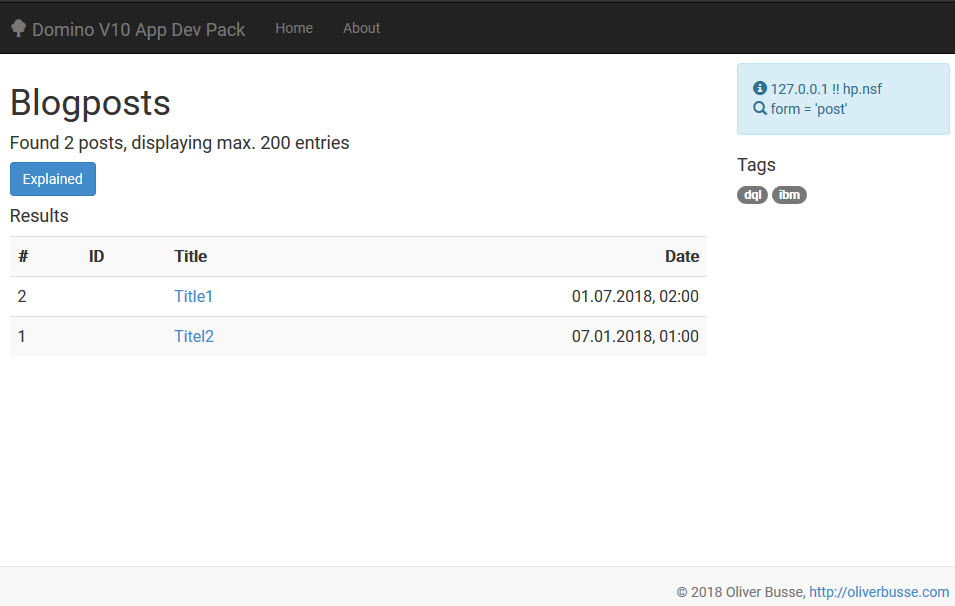
On the server console, I got:
[013713:000006-00007FCB3C40C700] 12/28/2018 04:39:42.88 AM PROTON> Session::init()
[013713:000006-00007FCB3C40C700] Tokens parsed
…
[013713:000006-00007FCB3C40C700] order = 1, level = 0, token = {form}, delim { } type = IDENTIFIER, opertype = NOT AN OPERATION, booltype = NONE
[013713:000006-00007FCB3C40C700] order = 2, level = 0, token = {=}, delim { } type = OPERATOR, opertype = EQUALITY, booltype = NONE
[013713:000006-00007FCB3C40C700] order = 3, level = 0, token = {'post'}, delim {'} type = QUOTED STRING, opertype = NOT AN OPERATION, booltype = NONE
…
[013887:000009-00007F93BA436700] Documents scanned = 4
[013887:000009-00007F93BA436700] Count of docs found = 2
Next, I tried with PROTON_SSL=1 ( eknori.kyr uses a valid Lets Encrypt certificate, no client certificates created and configured at this time )
sh con proton*
PROTON_AUTHENTICATION=anonymous
PROTON_KEYFILE=eknori.kyr
PROTON_LISTEN_ADDRESS=0.0.0.0
PROTON_LISTEN_PORT=3002
PROTON_SSL=1
PROTON_TRACE_REQUEST=1
PROTON_TRACE_SESSION=1
lo proton
12/28/2018 04:10:14.55 AM PROTON> Build 0.2.2
12/28/2018 04:10:15.69 AM PROTON> Listening on 0.0.0.0:3002, SSL-ENABLED
12/28/2018 04:10:15.69 AM PROTON> Server initialized
12/28/2018 04:10:15.69 AM PROTON> Server allows Anonymous access only.
sh ta o
PROTON Listening on 0.0.0.0:3002, SSL-ENABLED
HTTP Server Listen for connect requests on TCP Port:80, 443
When I know try to open https://eknori.blogsite.org:3000, I get

Secure Connection Failed
The connection to eknori.blogsite.org:3000 was interrupted while the page was loading.The page you are trying to view cannot be shown because the authenticity of the received data could not be verified. Please contact the website owners to inform them of this problem.
Request headers (355 B)
Accept text/html,application/xhtml+xm…plication/xml;q=0.9,/;q=0.8
Accept-Encoding gzip, deflate, br
Accept-Language en-US,de;q=0.7,en;q=0.3
Connection keep-alive
DNT 1
Host eknori.blogsite.org:3000
Upgrade-Insecure-Requests 1
User-Agent Mozilla/5.0 (Windows NT 10.0; …) Gecko/20100101 Firefox/64.0
I have verified that I can connect to PROTON
[root@serv02 domino-node-list]# openssl s_client -connect eknori.blogsite.org:3002
CONNECTED(00000003)
depth=2 O = Digital Signature Trust Co., CN = DST Root CA X3
verify return:1
depth=1 C = US, O = Let's Encrypt, CN = Let's Encrypt Authority X3
verify return:1
depth=0 CN = eknori.blogsite.org
verify return:1
Certificate chain
0 s:/CN=eknori.blogsite.org
i:/C=US/O=Let's Encrypt/CN=Let's Encrypt Authority X3
1 s:/C=US/O=Let's Encrypt/CN=Let's Encrypt Authority X3
i:/O=Digital Signature Trust Co./CN=DST Root CA X3
Server certificate
-----BEGIN CERTIFICATE-----
MIIFkzCCBHugAwIBAgISA02ojw4Nx7YNceZNEQjzQ6HRMA0GCSqGSIb3DQEBCwUA
MEoxCzAJBgNVBAYTAlVTMRYwFAYDVQQKEw1MZXQncyBFbmNyeXB0MSMwIQYDVQQD
ExpMZXQncyBFbmNyeXB0IEF1dGhvcml0eSBYMzAeFw0xODExMjQwOTI5NDdaFw0x
OTAyMjIwOTI5NDdaMB4xHDAaBgNVBAMTE2Vrbm9yaS5ibG9nc2l0ZS5vcmcwggEi
MA0GCSqGSIb3DQEBAQUAA4IBDwAwggEKAoIBAQCF64IGqJ1K6AB4Is7KasQEdaiv
gN5Fh1VUulz8xY/hCshgyIP46weexrU6jpmUE/DUQSuC/YfzpF7wohZrtd+4AHwd
Hu+ICmGh8tGa1KRv2j/Gpu2Cj1h1uXms+qdMBX/fQzQ9pM/8o4PS1NvUkt58dpL0
1zpbyr9ibbfGV1VPE68zCDWYT+S1VhC/sXt09B32zsd+LC5bJgtqbYUa5dghbDnY
G7qLI3ahy/atRMD4+Qdyk4yJqqQO58LMKO/+h9er8JNxMXoDDaT54Sq7owRHm3Vn
EkomPPriIXEizqXd1GwpAYc/uiaOYUorUFnoA40u8Gi2RlTHh2ze6rLzplrnAgMB
AAGjggKdMIICmTAOBgNVHQ8BAf8EBAMCBaAwHQYDVR0lBBYwFAYIKwYBBQUHAwEG
CCsGAQUFBwMCMAwGA1UdEwEB/wQCMAAwHQYDVR0OBBYEFGUvZj1OYKlDBGAiMref
eMYoSN0dMB8GA1UdIwQYMBaAFKhKamMEfd265tE5t6ZFZe/zqOyhMG8GCCsGAQUF
BwEBBGMwYTAuBggrBgEFBQcwAYYiaHR0cDovL29jc3AuaW50LXgzLmxldHNlbmNy
eXB0Lm9yZzAvBggrBgEFBQcwAoYjaHR0cDovL2NlcnQuaW50LXgzLmxldHNlbmNy
eXB0Lm9yZy8wUgYDVR0RBEswSYITZWtub3JpLmJsb2dzaXRlLm9yZ4IPZWtub3Jp
LnNwZG5zLmRlgg9la25vcmkuc3BkbnMuZXWCEGVrbm9yaS5zcGRucy5vcmcwTAYD
VR0gBEUwQzAIBgZngQwBAgEwNwYLKwYBBAGC3xMBAQEwKDAmBggrBgEFBQcCARYa
aHR0cDovL2Nwcy5sZXRzZW5jcnlwdC5vcmcwggEFBgorBgEEAdZ5AgQCBIH2BIHz
APEAdwB0ftqDMa0zEJEhnM4lT0Jwwr/9XkIgCMY3NXnmEHvMVgAAAWdFRKvdAAAE
AwBIMEYCIQCbF0dO0sH/+n0JgzUdKrNQdSXi0icdC/tcgoZJMWbBsQIhALrmWoIq
aOAryVyB5BdiIaCJ4gkQpltzZlMXsf2a8S6EAHYAY/Lbzeg7zCzPC3KEJ1drM6SN
YXePvXWmOLHHaFRL2I0AAAFnRUSr+gAABAMARzBFAiARZMQ/xNmVsD1AtFKhsjP/
JT7Ly1w/4t1lpCc9llWC6gIhAL9AvzdQfP3JSezUftlhbQwUq8pl87yilvM7tF/6
fJm9MA0GCSqGSIb3DQEBCwUAA4IBAQBWBIEnaXToqKlLepvxllJzJRaG4IdtDpHC
BN+bSsf5pCR9a1IOiJURdneLUF2RFYEtK8YOsWhEgpFodC/lEGC7P9AlPwK24/vO
Wyd2jPbCgpyzmp+8Hc6QLhttxz+Pd+MrjKFuYhpFkGqigAZGywiz12wPjhNOwhkI
iLpGENPnfJA/DPD01Zk0/4+toAhayuKqzVVB47W2O88dHB5TpsknGwVAWBAouTpm
hy8mHuVNk0+fwXGn739kLgZlsv95NWLCLIo5InJ5eHSQKgAU9uzRo5fzFXdRgxHk
w+4uKbruLxzi2IXUA214xEycylq49/jXePphfAsPXDvMYtmQRLcx
-----END CERTIFICATE-----
subject=/CN=eknori.blogsite.org
issuer=/C=US/O=Let's Encrypt/CN=Let's Encrypt Authority X3
No client certificate CA names sent
Peer signing digest: SHA256
Server Temp Key: ECDH, P-256, 256 bits
SSL handshake has read 3260 bytes and written 415 bytes
New, TLSv1/SSLv3, Cipher is ECDHE-RSA-AES256-GCM-SHA384
Server public key is 2048 bit
Secure Renegotiation IS supported
Compression: NONE
Expansion: NONE
No ALPN negotiated
SSL-Session:
Protocol : TLSv1.2
Cipher : ECDHE-RSA-AES256-GCM-SHA384
Session-ID: 49DA29C84DEFE38DAE3B7458F1E59859145DC5C27A27B248E1AC1958175F3BCC
Session-ID-ctx:
Master-Key: EC83FBCB155BEF83E9450C73D6A56A487DE933FC2D1405F3D95E725D9698962378BC65CA8D683F985415DF02D39A266F
Key-Arg : None
Krb5 Principal: None
PSK identity: None
PSK identity hint: None
TLS session ticket lifetime hint: 7200 (seconds)
TLS session ticket:
0000 - b8 b4 e4 5d 80 ec 53 c5-a5 06 8c 23 19 82 2e f2 …]..S….#….
0010 - 4e 66 a9 3a 5c d6 d6 09-b1 cb 69 b2 2e 16 f9 37 Nf.:.….i….7
0020 - 81 b6 db 13 a3 08 76 e0-59 91 38 12 15 0a 43 9e ……v.Y.8…C.
0030 - da df b2 8c d4 57 00 be-ef 77 30 12 77 4e 08 92 …..W…w0.wN..
0040 - 1c d6 ee ca d2 98 41 79-47 c7 b7 69 1e 93 f4 91 ……AyG..i….
0050 - 80 8e 9a 20 f7 88 30 4d-22 3b 96 37 22 6c 1e bd … ..0M";.7"l..
0060 - ca 98 87 3c 25 4c ca 33-c9 07 a3 45 a3 92 51 9c …<%L.3…E..Q.
0070 - a2 60 a6 fa 3f 5d 8f 6e-30 f9 75 4e 8d e1 17 ea .`..?].n0.uN….
0080 - f2 99 c5 74 fb d4 94 38-9d 29 39 8a 01 82 50 1a …t…8.)9…P.
0090 - e0 a2 af 40 44 75 a6 2d-a1 06 c5 9a 50 7a 3c 2e …@Du.-….Pz<.
Start Time: 1545966761 Timeout : 300 (sec)
Verify return code: 0 (ok)
read:errno=0
I also tried a simple https://eknori.blogsite.org:3000. I (expected) result is the following server console output
[013816:000007-00007FBB7D375700] 12/28/2018 04:48:24.89 AM PROTON> GET request without QUERY [src/core/ext/filters/http/server/http_server_filter.c:236]
[013816:000007-00007FBB7D375700] 12/28/2018 04:48:24.89 AM PROTON> Invalid entry in accept encoding metadata: ' deflate'. Ignoring. [src/core/lib/surface/call.c:940]
[013816:000007-00007FBB7D375700] 12/28/2018 04:48:24.89 AM PROTON> Invalid entry in accept encoding metadata: ' br'. Ignoring. [src/core/lib/surface/call.c:940]
So, apparently, connection via external server IP address is possible, but there is a problem when the node app tries to communicate to the PROTON addin.
Unfortunately, there are no error messages; neither on the Domino server console nor in the node app.
I upgraded my Domino Server and Notes Client from V10 to V10.01 yesterday. V10.01 introduces some new features for developers.
Amongst others, there is a new class in LotusScript; NotesDominoQuery. The class is used to compile, tune, and run Domino Query Language queries.
The class and it’s methods and properties is not (yet) documented in the Domino Designer Help. But you can find the documentation ( and examples ) here.
Also not documented is that you cannot run a query client/server. According to John Curtis this is not possible at this point.

I put together a small agent to execute a simple query on the server names.nsf that should return the number of douments found. When I ran the agent ( tell amgr run “db.nsf” ‘myAgent’, it found the document matching the query but also printed additional lines to the console.
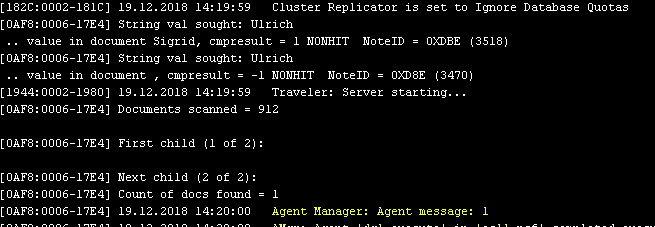
I did some research and found that I have to set DEBUG_GQF_QUERY=0. John Curtis confirmed on Twitter that the variable has to be set.
